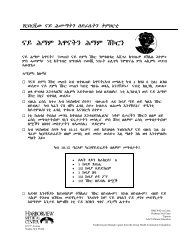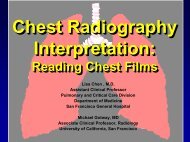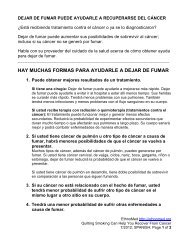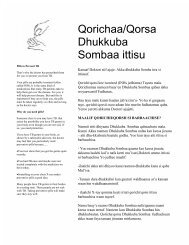Somali Knowledge Attitude Practices Study (KAPS) - EthnoMed
Somali Knowledge Attitude Practices Study (KAPS) - EthnoMed
Somali Knowledge Attitude Practices Study (KAPS) - EthnoMed
Create successful ePaper yourself
Turn your PDF publications into a flip-book with our unique Google optimized e-Paper software.
functions<br />
Box 1: Snapshot of Political Landscape<br />
The political landscape of <strong>Somali</strong>a is summed in the following quotation:<br />
“Since the overthrow of the Siad Barre government in 1991, the resultant collapse of the<br />
government structures and destruction of infrastructures, the ensuing civil war has brought<br />
about widespread displacement and severe loss of life. Parts of <strong>Somali</strong>a remain beset by<br />
conflict and division, prone to drought and vulnerable to flood. It has some of the worst child<br />
and maternal survival indicators in the world. <strong>Somali</strong>a has little or no authoritative<br />
government, high levels of criminality, sporadic armed conflict, an absence of economic recovery,<br />
endemic humanitarian needs, minimal health care and education and population<br />
displacement” UNICEF (2004, p.2).<br />
A transitional National Government (TNG) was set up in 2000 that is still to make real impact in<br />
consolidating the country into a cohesive whole. Nonetheless, the northern areas of the country<br />
enjoy safety and security with the Northwest <strong>Somali</strong>land having made remarkable progress<br />
towards providing law and order hence securing tenuous peace (UNICEF, 2004). Parts of central<br />
and southern <strong>Somali</strong>a are developing levels of governance, security and economic activity that<br />
reflect a more stable environment. The clan continue to provide essential level of physical and<br />
social security to many <strong>Somali</strong> households, despite its being a powerful force in contributing to<br />
unstable alliances, diffusion of power and communal conflict over scarce resources. At grass-root<br />
level, elders and other community leaders wield some political power and fill the vacuum in<br />
governance structures at that level (UNICEF, 2004 p.3).<br />
Gender discrimination is deeply rooted and remains a formidable barrier to women’s participation<br />
in decision making processes including access to, and control of resources (UNICEF, 2004 p.3).<br />
1.4 Methodology<br />
Recruitment and training of field assistants<br />
The generic field greater team comprised a minimum of six people and a maximum nine who<br />
were then put into sub-teams comprising three people of whom one served as a moderator,<br />
recorder/team leader and the third person assisted and served as a content control person to ensure<br />
that all critical pieces of information were collected.<br />
The team members were identified and selected by the FSAU staff on the ground with assistance<br />
of staff from partner organizations. To confirm their eligibility, the consultant gave them written<br />
and oral assessments. Those found to be inadequate were replaced by others who went through<br />
the similar assessments. For the oral part, they were gauged during the session on self<br />
introduction, expression of expectations and formulation of the rules that guided the team during<br />
the whole exercise. For the written part, each did a short write-up on a selected topic that was<br />
relevant to the study (e.g., brief write-up in English on the impact of conflict on breastfeeding in<br />
the region (the region was specified; their own home regions). This made it possible to gauge<br />
their capacities and subsequently was used to allocate them positions in the team.<br />
11






